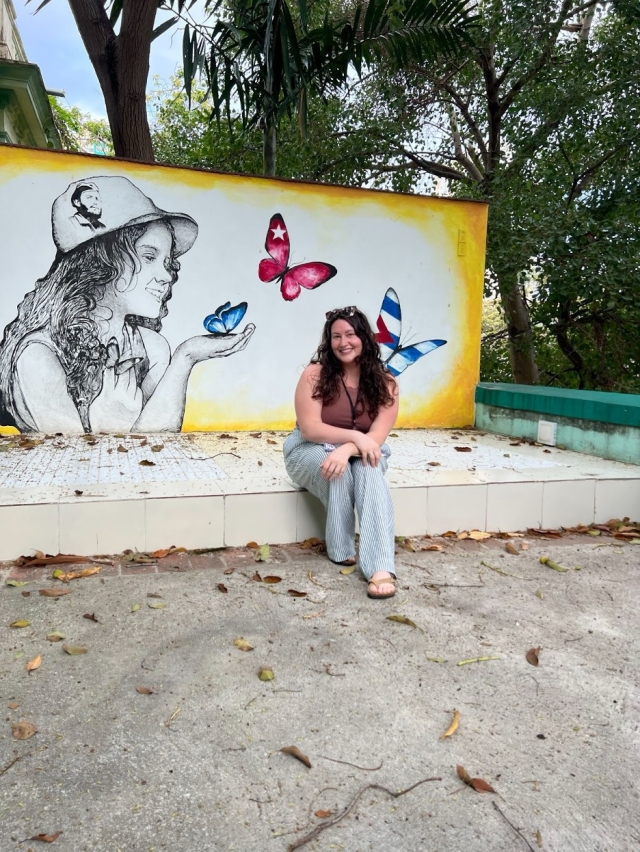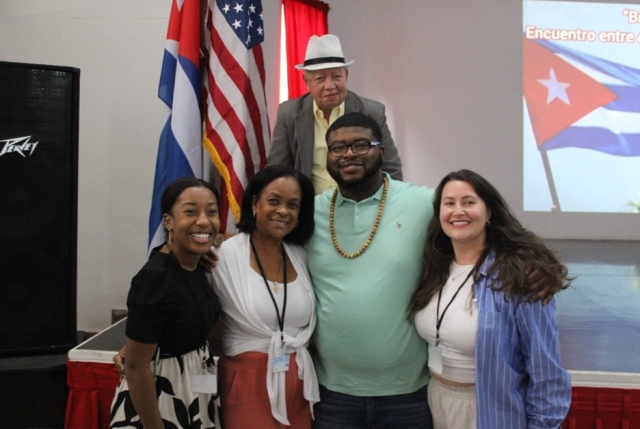LACS Grad Students Travel to Cuba for International Education Course
April 15, 2025

Learn more about Abigail Smith and Sarah Kistner’s recent trip to Cuba as part of their coursework in International Education Policy.
Tell us a bit about yourself.
Abigail: My name is Abigail Smith (she/her), I am an international student from Kingston, Jamaica studying International Education Policy as a Phd student. I currently work in the Global learning initiatives office as a graduate assistant. I became interested in the LACS certificate to connect with more graduate students on campus and to also deepen my knowledge of the region to enhance my studies.
Sarah: My name is Sarah Kistner, and I’m a first-year PhD student in International Education Policy. I also work at the Teaching and Learning Transformation Center here at UMD, where I support student success initiatives. I became interested in the Latin American and Caribbean Studies (LACS) certificate because of my longstanding passion for international education and my experiences working in the region over the years. I’ve always been drawn to understanding how history, politics, and culture shape education systems across the region and how we can learn from one another.
You just went to Cuba for a class. Can you tell us about the class and the purpose of this trip?
Abigail: Yes, so lucky for me this is my 3rd time going to Cuba, my first trips were in 2018. This trip specifically is led by Dr. Taylor Woodman and has been in an ongoing partnership over 10 years with the Cuban Pedagogues Association (APC) . The class is EDHI788X/798: International Investigations in Cuban Education: An International Fieldwork Practicum. Though Cuba is stones throw away from Jamaica, we did not learn much about their education system and developments. As a research interest of mine is South-South cooperation within higher education, I wanted to learn more about Cuba’s approach to the internationalization of higher education as they have been at the forefront of educating other Caribbean nationals since the 60s.
Sarah: The purpose of the trip was to gain skills in research through a fieldwork practicum and engage directly with Cuban educators, students, and community organizations. It was an immersive experience designed to challenge our assumptions and provide a more nuanced view of Cuban society. My goal was to learn more about how play is incorporated into their educational system and how it may shape their values as a society.
What were some key takeaways from this trip?
Abigail: One of the most striking aspects of Cuba is how deeply education is tied to national identity. From the revolutionary literacy campaign in the 60s-70s, the structuring of higher education around community needs. Learning in Cuba is not just about knowledge acquisition but about shaping a society, especially for those of the greatest need. Countless people from around the world have been able to further their education due to the generosity of Cubans.
Yet, the challenges are undeniable. The U.S. blockade continues to impact the economy, bleeding into education and international relations. Cuba’s story is a reminder that education is truly political.
Sarah: One of the most meaningful takeaways for me was the importance of building genuine relationships and learning how to communicate thoughtfully across different cultural contexts. Being in Cuba reminded me that meaningful engagement starts with humility, curiosity, and respect. As a researcher, it also reinforced the importance of approaching communities ethically, listening more than speaking, being mindful of power dynamics, and ensuring that any knowledge exchange is reciprocal and grounded in trust. These lessons are ones I’ll carry forward in all of my future work in research!
How does this trip relate to your research goals?
Abigail: The experience allowed me to have a better understanding of Cubans internationalization through scholarships to students with the greatest need. I also gained insights into the experiences of international students studying in Cuba, which is also a research interest of mine as well. I got the opportunity to speak to a student from antigua as well as students from Nigeria currently pursuing degrees in Cuba.
Sarah: My research focuses on education in conflict and emergencies, and this trip helped me think more critically about resilience and innovation in educational systems under pressure—whether from economic sanctions, political isolation, or limited resources. Cuba’s model challenged me to consider alternative approaches to equity, peacebuilding, and educational access.
Was there anything that surprised you?
Abigail: On this visit, we had the opportunity to unpack the racialized experiences of Afro Cubans in present day Cuba. It was interesting to see the responses based on who we asked, often varied by generations and racial background. We had the opportunity to unpack this with Afro Cuban scholars and students which helped to give an honest view, tracing the origins through history. On my own, I had the opportunity to visit Beyond Roots, Cuba’s first Afro-style store and a thriving business that includes a café, a hair salon and a cultural center promoting Afro-Cuban culture. As well as Callejon de Hamel, a community featuring paintings, murals and sculptures that pay tribute to Afro-Cuban culture, with most of the murals depicting Afro-Cuban deities. These experiences tied together allowed me to have a better understanding of the Afro-Cuban experience and how it's tied to the liberation of Black people globally.
Sarah: I was surprised by how open and welcoming people were towards our group, especially given the complicated history between the U.S. and Cuba. There was a real desire for dialogue and connection. I was also deeply moved by how much emphasis is placed on human dignity and ensuring a good quality of life for all. That collective sense of care for community, well-being, and shared responsibility. This stood out to me in a powerful way.




